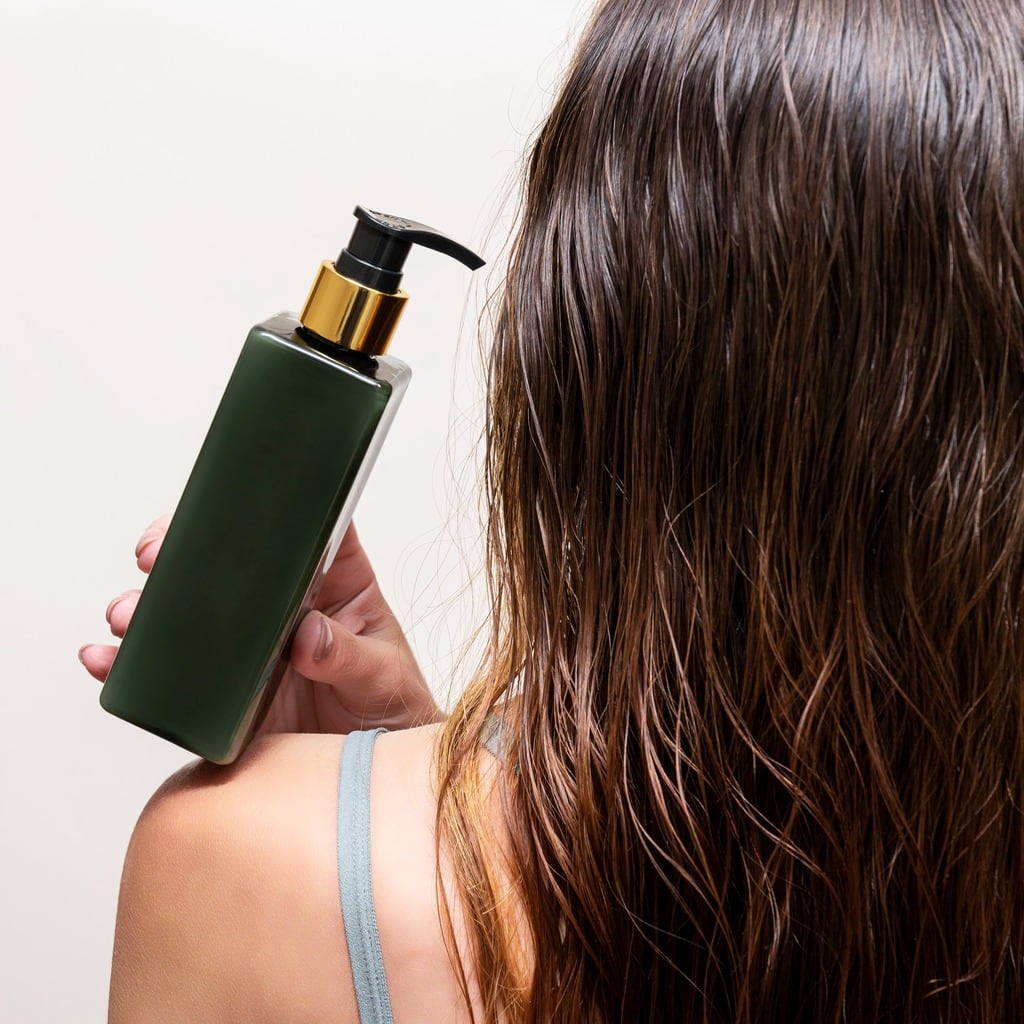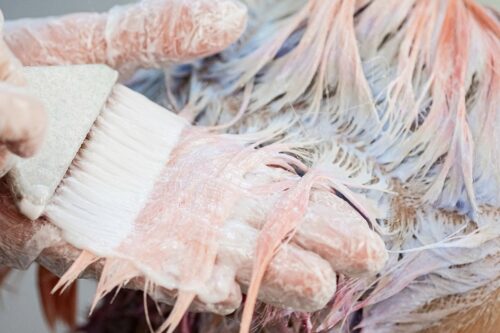When lightening your hair, one of the first steps is to bleach it so you have a nice bright base to apply your color.
But everyone’s hair is different, and sometimes hair doesn’t seem to want to lighten. You end up with bleached hair that looks more copper than yellow or white.
Now you’re left all alone trying to figure out how to remove copper tones from bleached hair, but don’t fret. We’ve got your back.
Why Does Bleached Hair Become Copper?

There are so many different shades and pigments in natural brunette hair. In many darker colors, orange and red are common undertones.
So, when bleaching your hair, sometimes the bleach doesn’t lift all the pigment out and you’re left with copper instead of canary yellow or white blonde.
Even if you follow the instructions on your bleach exactly, you can still end up with this issue. Even professional stylists sometimes find it difficult to get their clients’ hair to fully brighten without going copper.
However, if your hair is copper after bleaching it doesn’t mean it’ll stay looking this way forever.
You just need to know how to remove these unwanted copper tones from your bleached hair so you can go blonde without the orange hues showing through.
How to Remove Copper Tones from Bleached Hair Without Causing Damage

Unfortunately, a lot of people just want to bleach their hair again right away, and this will cause a lot of damage to their hair. Instead, take the advice below to try and even out the tones in your tresses.
Neutralize the Color
After you bleach your hair, your cuticles are usually very susceptible to being dyed and toned. So, you can wash your hair with a toned shampoo to try and fade or remove the coppery pigment.
To neutralize copper, you’ll want to find a color that’s the opposite of orange.
Checking out a color wheel will show you that blue and purple sit on the other side of the orange, so get shampoos in these shades.
More yellowy copper tones are best removed from bleached hair with blue-toned shampoo and conditioner. Brassier, orangey copper can be gotten rid of with purple.
Simply give your hair a quick wash and condition with these toned products, and you should find that most of the unwanted pigment lifts.
Sometimes it will take a few washes over the course of a week or 2 to work, but rest assured, neutralizing the color does wonders.
Use an Anti-Brass Treatment
You may be able to find anti-brass cleansers that you can wash your hair with. You apply the treatment when your hair is wet, lather it, and leave it to sit for around a minute.
Rinse it out just as you would if it were regular shampoo, and then use the treatment a couple of times a week.
Washing your hair with this cleanser three times a week works best when you’re waiting to apply your dye over the bleach.
Try Clarifying

If you don’t have an anti-brass cleanser available near you, try a clarifying shampoo instead.
Clarifying shampoos are pretty harsh on your hair, so please be careful not to use too much of it after you’ve bleached your locks.
Using a clarifying shampoo is how you can remove chemicals, oils, and copper tones from bleached hair.
Try not to use clarifying shampoos too often, even on non-bleached hair, though, as they can be damaging if used frequently.
Try a Glaze or Gloss
It can take a while for a hair glaze or gloss to work, but they can help get rid of copper in hair that’s been bleached.
They can also reinforce your desired tone as well as make your hair smooth and shiny.
Glazes and glosses are usually applied after you’ve dyed your hair your desired color, but they can be worn on bleached hair, too.
Using a glaze or gloss is especially a good idea if you don’t apply your dye right after your hair is bleached.
For example, some people’s hair becomes quite damaged from the bleach so you may have to wait a few weeks before the actual dye treatment is applied on top.
Go Dark Again
It’s not always easy to go from dark hair to light. Some natural brunettes find it can take six months to a year before they can go fully blonde.
If you’ve bleached your hair and found it’s come out full of copper tones, then how you can combat it by going dark.
You don’t have to dye your hair as dark as it is naturally. However, a medium to light brunette shade may be best to wear for a couple of weeks.
Wait at least eight weeks before you attempt to bleach your hair again. You might find that this time it has fewer copper tones.
Repeat the process as needed. Essentially, bleach your hair, and go two or three shades lighter with your dye every time.
Eventually, you’ll be able to lighten your hair enough with no coppery tones so you can go icy blonde if you wish.
Try Bleaching Again
Bleaching your hair too many times in a row is incredibly damaging.
You’ll end up with fried hair, split ends, and hair that just breaks off when heat is applied if you try this too often.
However, you can bleach your hair two times in a row without dying in between if you’re careful.
This doesn’t mean you can bleach your hair twice on the same day. No way! You’ll totally fry your strands.
Wait a week, but two weeks would be best, then bleach your hair again. From there you can start working your way towards blonde.
Rinse with Apple Cider Vinegar
If none of the steps above work, and you don’t want to bleach your hair again, then consider apple cider vinegar. It contains acids that can neutralize the copper tones in your hair.
The acids are also good at stripping unwanted pigments such as the orange ones causing your problem.
Wash and condition your hair as you would normally, then rinse it with an apple cider vinegar mixture where it’s 2 cups of water to 1 cup of vinegar.
If you want it to be even more effective, use blue or purple food coloring in the apple cider vinegar mixture to help neutralize the unwanted tones in your hair.
You can repeat this once a week or once every two weeks as needed.
Tips on How to Prevent Bleached Hair Turning Copper Later
If you’ve bleached your hair, it looks fine, and now you have to wait a few days before you can dye it, it may still end up turning copper. There are a couple of things you can do to prevent this from happening.
Avoid Sun Exposure
The sun can easily warm up your bleached hair and it may be how you accidentally bring out copper tones you wish to remove.
Hide your hair up under a hat or a head wrap if you want to go out for long periods in the sun. Also, use a UV protection spray daily.
Filter Your Water
Many people have hard water in their showers. Get a filter for your showerhead to soften the water and remove the minerals that can create an orange hue in your locks.
Don’t Go Swimming
Both chlorine and salt can cause oxidization in your hair. It’ll be even easier for your hair to develop an unwanted color shortly after bleaching.
If you want to go to a swimming pool or have a dip in the ocean, keep your head above water and use a rubber swimming cap.
Don’t Use Heat Styling
If you want to curl your hair, use heatless overnight methods. If you have curly hair and you want to straighten your curls, please avoid doing so as much as you can until you can cover the bleach with dye.
Some heat tools can leave behind orange and yellow tones, especially on bleached tresses.
Luckily there are lots of ways you can learn how to remove copper tones from bleached hair. You should also apply the tips to help prevent the unwanted colors from showing up after your bleaching session.
In a couple of weeks to months, you’ll be able to lift all the undesirable pigment right out and dye your hair the blonde shade you desire.






